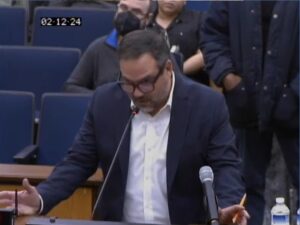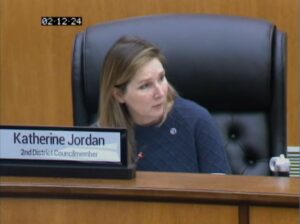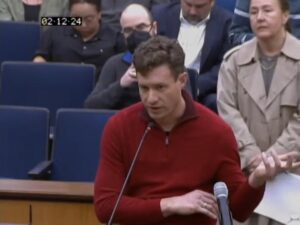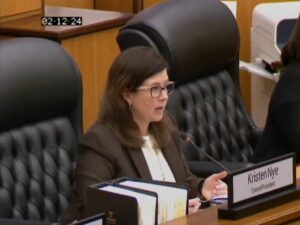As proposed bills to address the issue make their way through the General Assembly, the City of Richmond has taken its first regulatory steps to change its tax collection practices that in recent years have plagued restaurant owners in particular.
City Council on Monday approved an ordinance amending city code to allow tax payments to be applied to the month they are made, rather than applying them first to delinquent balances as is currently required by a state law.
The practice has resulted in a snowball effect in which tax payments are put toward unknown penalties, leaving only part of the balance paid and racking up additional penalties without notice to the taxpayer. For restaurant owners making meals tax payments, the practice in some cases has produced tax bills amounting to tens or even hundreds of thousands of dollars owed to the city.
At Monday’s meeting, councilmembers heard from some of those restaurateurs directly in a hearing that preceded the vote.
“If this ordinance had been in place in 2019, my problem never would have happened,” said Brad Hemp, a former co-owner of Brenner Pass and Metzger Bar & Butchery who was among the first to bring the issue to light, after resolving a $10,000 bill with the city in 2021. The issue has gained heightened attention in recent weeks as more restaurateurs have relayed similar stories.
Referring to others in attendance, Hemp continued, “If this ordinance had been in place, none of their problems would exist either, or they’d be much, much smaller and it’d be easy to deal with. I’m glad finally change is coming.”
Matt Mullett, co-founder of Richbrau Brewing, was among several other speakers who criticized the city’s handling of the issue, which he said had had a nearly $100,000 impact to the business’s balance sheet.
“The unspoken side of this is the human suffering involved when government fails to do what it needs to hold itself accountable to its citizens and its taxpayers,” Mullett said. “How many businesses have failed because of the way the current administration has handled the collection of tax revenue? How many families have suffered through untold battles with the city?”
Following the hearing, councilmembers said they were empathetic to their experiences and were committed to fixing the issue, describing Monday’s changes as an initial step.
“To the businesses that came down, I just want to say I’m appalled too,” said Councilmember Katherine Jordan, whose Second District includes Brenner Pass. “It’s really hard to hear your stories and know that there were solutions that we’re voting on now that we could’ve done earlier.”
Referring to previous efforts with Hemp, Jordan added, “I know that we had tried to get this very paper a couple years before and were told that it wasn’t possible. I’m glad that we have a different reading of what is possible now, but I just want the restaurants to know we do hear you.
“I wish we were not at this point right now and I wish this had happened earlier, but I’m grateful that you guys came forward and you told your stories,” Jordan said. “Individually as council members, we may hear from one or two people at most, but collectively you guys have made significant change on this issue. I know there’s more change that needs to happen.”
The tax policy changes are aimed at addressing interest and late-payment penalties applied on personal property taxes, which are currently assessed a 10 percent penalty and 10 percent interest the first day a payment is delinquent. The changes would reduce the penalty to 2 percent for the first month and hold off interest until the following month.
Payment plans offered to taxpayers would be extended from five years to six years, in accordance with a change that was approved in last year’s assembly session. The city also plans to offer different repayment terms for individuals and businesses, and to lower the minimum down payment required to enter a payment plan.
Other proposed changes include electronic bill payment options, removing convenience fees for payments made using a credit card, and outreach to businesses about the city’s billing and taxation practices.
Beyond the changes to its own policies, the city also is seeking an update to state law to allow discretion on the application of a seller’s commission for businesses that collect meals taxes.
Adopted in 2018 – the same year that Richmond increased its meals tax to 7.5 percent per meal sold in the city – the commission allows businesses to keep a percentage of the meals taxes they collect to cover credit card processing fees used in collecting that tax, but only if their accounts are in “good standing” with the city. The requirement has been said to be contributing to restaurants’ high delinquent tax bills.
Del. Michael Jones, a former City Councilmember, is the chief patron on the proposed law change, House Bill 1535.

The Capitol building beside the new General Assembly Building high-rise and Old City Hall. (SkyShots Photography)
Another bill, H.B. 1483 patroned by Del. Delores McQuinn, would allow Richmond and other cities to apply meals tax payments to the tax returns they accompany, rather than to delinquent accounts first as existing law requires. The bill also would allow city finance directors to waive penalties and interest if it’s determined to be in the locality’s best interest.
On Tuesday – the assembly’s crossover day, in which bills are moved between the House and the Senate halfway through the legislative session – both of those bills successfully passed the House, leaving their fate up to the Senate. Last week, a majority of the Senate Finance and Appropriations Committee balked at a Senate version of the latter bill.
The bills are supported by the Virginia Restaurant Association, a Richmond-based group that has demanded that the city pay back the penalties and interest to affected restaurants.
Hemp, the former Brenner Pass co-owner, has proposed that the city provide a meals tax penalty amnesty, contending it would go further in addressing the issue than the ordinance that council adopted Monday. In Monday’s hearing, Hemp reiterated his proposal.
“While I speak in support of the ordinance tonight, I do think that we need a little bit more comprehensive solution to address the injuries that these people have suffered,” Hemp said. “I proposed a meals tax amnesty; that might not be the best way to do it, but I think we can figure out a way to do it that’s fair and transparent and applies equally to everybody.”
Before calling for the vote, Council President Kristen Nye stressed that the ordinance is the first of more changes to come.
“This is just a start,” Nye said. “The main thing that I think all of us here and the administration need to work on is the trust.”
Addressing the restaurant owners who spoke, Nye added, “I know you feel like we’ve wronged you, and the communication has been awful over the years. We’re trying to right the ship. This ordinance is one piece of it; there are many other things we need to do.”
As proposed bills to address the issue make their way through the General Assembly, the City of Richmond has taken its first regulatory steps to change its tax collection practices that in recent years have plagued restaurant owners in particular.
City Council on Monday approved an ordinance amending city code to allow tax payments to be applied to the month they are made, rather than applying them first to delinquent balances as is currently required by a state law.
The practice has resulted in a snowball effect in which tax payments are put toward unknown penalties, leaving only part of the balance paid and racking up additional penalties without notice to the taxpayer. For restaurant owners making meals tax payments, the practice in some cases has produced tax bills amounting to tens or even hundreds of thousands of dollars owed to the city.
At Monday’s meeting, councilmembers heard from some of those restaurateurs directly in a hearing that preceded the vote.
“If this ordinance had been in place in 2019, my problem never would have happened,” said Brad Hemp, a former co-owner of Brenner Pass and Metzger Bar & Butchery who was among the first to bring the issue to light, after resolving a $10,000 bill with the city in 2021. The issue has gained heightened attention in recent weeks as more restaurateurs have relayed similar stories.
Referring to others in attendance, Hemp continued, “If this ordinance had been in place, none of their problems would exist either, or they’d be much, much smaller and it’d be easy to deal with. I’m glad finally change is coming.”
Matt Mullett, co-founder of Richbrau Brewing, was among several other speakers who criticized the city’s handling of the issue, which he said had had a nearly $100,000 impact to the business’s balance sheet.
“The unspoken side of this is the human suffering involved when government fails to do what it needs to hold itself accountable to its citizens and its taxpayers,” Mullett said. “How many businesses have failed because of the way the current administration has handled the collection of tax revenue? How many families have suffered through untold battles with the city?”
Following the hearing, councilmembers said they were empathetic to their experiences and were committed to fixing the issue, describing Monday’s changes as an initial step.
“To the businesses that came down, I just want to say I’m appalled too,” said Councilmember Katherine Jordan, whose Second District includes Brenner Pass. “It’s really hard to hear your stories and know that there were solutions that we’re voting on now that we could’ve done earlier.”
Referring to previous efforts with Hemp, Jordan added, “I know that we had tried to get this very paper a couple years before and were told that it wasn’t possible. I’m glad that we have a different reading of what is possible now, but I just want the restaurants to know we do hear you.
“I wish we were not at this point right now and I wish this had happened earlier, but I’m grateful that you guys came forward and you told your stories,” Jordan said. “Individually as council members, we may hear from one or two people at most, but collectively you guys have made significant change on this issue. I know there’s more change that needs to happen.”
The tax policy changes are aimed at addressing interest and late-payment penalties applied on personal property taxes, which are currently assessed a 10 percent penalty and 10 percent interest the first day a payment is delinquent. The changes would reduce the penalty to 2 percent for the first month and hold off interest until the following month.
Payment plans offered to taxpayers would be extended from five years to six years, in accordance with a change that was approved in last year’s assembly session. The city also plans to offer different repayment terms for individuals and businesses, and to lower the minimum down payment required to enter a payment plan.
Other proposed changes include electronic bill payment options, removing convenience fees for payments made using a credit card, and outreach to businesses about the city’s billing and taxation practices.
Beyond the changes to its own policies, the city also is seeking an update to state law to allow discretion on the application of a seller’s commission for businesses that collect meals taxes.
Adopted in 2018 – the same year that Richmond increased its meals tax to 7.5 percent per meal sold in the city – the commission allows businesses to keep a percentage of the meals taxes they collect to cover credit card processing fees used in collecting that tax, but only if their accounts are in “good standing” with the city. The requirement has been said to be contributing to restaurants’ high delinquent tax bills.
Del. Michael Jones, a former City Councilmember, is the chief patron on the proposed law change, House Bill 1535.

The Capitol building beside the new General Assembly Building high-rise and Old City Hall. (SkyShots Photography)
Another bill, H.B. 1483 patroned by Del. Delores McQuinn, would allow Richmond and other cities to apply meals tax payments to the tax returns they accompany, rather than to delinquent accounts first as existing law requires. The bill also would allow city finance directors to waive penalties and interest if it’s determined to be in the locality’s best interest.
On Tuesday – the assembly’s crossover day, in which bills are moved between the House and the Senate halfway through the legislative session – both of those bills successfully passed the House, leaving their fate up to the Senate. Last week, a majority of the Senate Finance and Appropriations Committee balked at a Senate version of the latter bill.
The bills are supported by the Virginia Restaurant Association, a Richmond-based group that has demanded that the city pay back the penalties and interest to affected restaurants.
Hemp, the former Brenner Pass co-owner, has proposed that the city provide a meals tax penalty amnesty, contending it would go further in addressing the issue than the ordinance that council adopted Monday. In Monday’s hearing, Hemp reiterated his proposal.
“While I speak in support of the ordinance tonight, I do think that we need a little bit more comprehensive solution to address the injuries that these people have suffered,” Hemp said. “I proposed a meals tax amnesty; that might not be the best way to do it, but I think we can figure out a way to do it that’s fair and transparent and applies equally to everybody.”
Before calling for the vote, Council President Kristen Nye stressed that the ordinance is the first of more changes to come.
“This is just a start,” Nye said. “The main thing that I think all of us here and the administration need to work on is the trust.”
Addressing the restaurant owners who spoke, Nye added, “I know you feel like we’ve wronged you, and the communication has been awful over the years. We’re trying to right the ship. This ordinance is one piece of it; there are many other things we need to do.”








Was Nye the only one to express regret; amazingly they (Council and Mayor) are solely reactive on just about every issue and proactive on NOTHING for its residents or business owners.
Yet they keep voting straight ticket
First thing they should do is fire Sheila White, Director of Finance. Ultimately, she has done nothing to fix this problem. Also, the Finance Department is no longer using judicial tax sales to collect delinquent real estate taxes. I believe the city is owed more than $7M in unpaid real estate taxes. The new method of collecting delinquent real estate taxes is to get a judgment against the property owner, which really doesn’t do anything until the property is sold. Selling the properties at tax sales recoups some of the lost tax revenue but more importantly the new owners usually… Read more »
Richmond City council has been a complete debacle since the mid to late
seventies. It’s a joke. A bad one
A bad running joke with the same cast of clowns passing it down to a new class of clowns they elevated while in office!
As I posted about a week ago on a previous story about the meals tax, Richmond hasn’t been well managed since the days of a city manager-form of governance. I guess that may have been mid-70s, as you say. Unfortunately, the list goes well beyond a meals tax problem. The entire system is broken: schools, infrastructure, crime, public housing, building permits, utilities city jail… every single aspect of city government is broken. If Richmond were a business, it would be bankrupt. If it were publicly held, the Board of Directors would be in jail for malfeasance. Until the residents wake… Read more »
Huzzah! And if it were a Federal Government it would be… uh, the one we have now!
Different inputs cannot provide quality results in a broken system -Pirsig (more or less)
I could not agree more. Moved here in late 2019 and am dumbstruck by the city’s disfunction of which the meals tax is one example. The pitiful relationship between City Council and Richmond Public Schools fails children and families every single day. Last year I helped an elderly citizen work her way through the public housing system to secure a home for herself and her young grandson. What an eye-opener! Not a single step in the process moved forward without a weekly in-person visit to RRHA — and even so, it took months! Failing citizens left and right. Richmond has… Read more »
There has to be a way to wipe the slate clean and start over with a new mayor and city council? (not written in a threatening manner)
I hope this is the start of real change for Richmond City restaurants, and feel for all they’ve gone through. Time will tell if City Council takes it further.
The city owes the restaurants money. Pay them back!
If mental giants like Jones and McQuinn proposed the bills, you know it was based on sound fiscal and tax principles. Bureaucrats from the same political party have been exclusively in charge for decades. When will the voters learn?